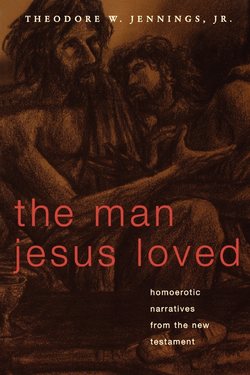Читать книгу Man Jesus Loved - Theodore W. Jr. Jennings - Страница 23
На сайте Литреса книга снята с продажи.
The Claim of Authority
ОглавлениеThe beloved is shown as the witness to Jesus’ death and resurrection, and is said to be the one whose testimony undergirds in some way the narrative we call the Gospel of John (19:35; 21:24). Is the point of singling out this disciple to claim a certain authority for him and his teaching?
Although this suggestion has regularly been tacitly assumed, it does not bear up well under scrutiny. At no point is the beloved said to be privy to information not available to the others. He is one of at least four witnesses to the death of Jesus. He and Peter both go to the empty tomb. Unlike Mary of Magdala, they do not encounter Jesus. Indeed the presence of the beloved disciple at a resurrection appearance is found only in the last chapter where he is in the company of others, most of whom have presumably seen the risen Jesus at one or both of the two previous group encounters.
What at first appears to be a significant role, that of eyewitness to the most important events, turns out to be less than crucial.1 Insofar as special information is involved, it seems to be trivial. The beloved disciple knows a few minutes before the others the identity of Jesus’ betrayer. This sort of detail is theologically insignificant.2 Nothing beyond personal significance is here, nothing that would establish the reputation of a school, nothing that would make the beloved an authoritative teacher.
To be sure, the Gospel of John is filled—certainly more so than the other Gospels—with what appears to be esoteric teaching concerning the identity of Jesus and the conflict between the gospel and the world. None of this esoteric teaching is ever associated with the beloved disciple. Jesus explains far more to Nicodemus (3:1–21) or the Samaritan woman (4:1–42) than to him. Even in the last discourse, where so much of theological significance is said, the beloved plays no role whatever. Peter, Judas not Iscariot, Philip, and Thomas all figure in this discussion, but no mention is made of the beloved.
Had the aim been to establish the authority of a particular teacher, a better job could have been done. The beloved might at least have been unambiguously identified, for example, or made privy in some way to Jesus’ teachings. At least his presence alongside the others might have been mentioned when a decisive theological issue was discussed.
The supposition that the character of the beloved disciple is introduced in order to make a claim for the authority of some or other teaching or school of Christian thought does not stand up to scrutiny.3 At no point does the beloved play any such role. Indeed the text itself precludes anyone from such a role since all of Jesus’ teaching, however esoteric it may seem, is nevertheless public. Furthermore, more revelations will come to all the followers from the Spirit (16:13).
The most that can be made of the authority of the beloved is that he, like others, was one of Jesus’ followers. He does not have authority because he was the beloved (for no special knowledge is attributed to him as beloved), but only the same sort of authority as other followers. Some commentators have supposed that even this minimal authority may have been important to the “community of the beloved disciple” (the “we” of 21:24), but this conclusion would hold up only if the teaching of the beloved were regarded by other communities as heterodox. Thus, a claim that his testimony, while not by any means supplanting that of Peter, was nevertheless not heterodox but had a foundation similar to that of Peter and other disciples would be important. To carry this view forward, however, one must cease reading rivalry into the relationship between Peter and the beloved and accept that the beloved’s association with Peter rather than his special relationship to Jesus was the foundation of his authority.
